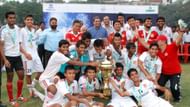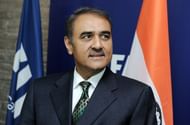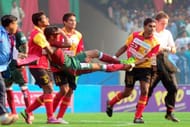When the AIFF started the National Football League (NFL) in 1996, there was optimism in the Indian football fraternity that the newly-launched tournament will take the beautiful game in the country to a new level.
But after one season, the interest started to die out and even a new television deal with Zee didn’t help matters. After 11 seasons, NFL was rebranded into the I-League with the aim of having a successful professional domestic league following the guidelines of the AFC.
However six years on, just like the NFL, the I-League too has become a fading brand and all the talk in Indian football now is about the IPL-style tournament that AIFF’s commercial and marketing partners IMG-Reliance have proposed.
Besides opposing the new tournament jointly under the banner of IPFCA (The Indian Professional Football Clubs Association), several club owners have hit out against the AIFF and their partners for degrading the I-League. The clubs want new changes to be made within the I-League and don’t want their importance to be undermined by a new tournament.
The clubs are even willing to run the I-League themselves if it’s made a separate legal entity. They have been fighting to get the I-League to become a separate legal entity for a long time now but the news that 13 of the 15 participating clubs for the 2013-14 I-League have failed the licensing test will be a deafening setback for the Indian clubs.
The two exceptions are the two new entries into the I-League – Bengaluru FC and Mumbai Tigers who were of course not part of the inspection that was carried out by the AIFF following the AFC guidelines.
All 14 clubs who applied for this test earlier this year, including United Sikkim, who were relegated from the I-League last season, failed to get the license that is necessary to play in the I-League and has to be renewed every year.
The clubs now have a deadline until August 14 to either appeal or request an exemption for the National License to participate in the I-League and Federation Cup this season. That exemption will only be granted for one more year only after which, as per rules, any failed club would be debarred from the I-League.
The failure highlights the shortcomings of the clubs to protect the I-League brand. Of course the blame game can go on between AIFF and clubs as to who is more responsible for the degradation of the country’s top most domestic competition but the fact is that the clubs haven’t kept their house in order.
The licensing test is based on five broad aspects – sporting, infrastructure, personnel & administration, finance and legal. There are around 41 mandatory requirements and failure in any one would result in teams not getting the license.
For some time the AIFF bosses didn’t respond to the verbal attacks of the club owners but following Thursday’s AIFF executive committee meeting, federation president Praful Patel blasted the I-League clubs for not meeting the licensing criteria and also pointed the need of having the new IPL tournament to boost the interest in Indian football.
“If we strictly go by the book most clubs will cut a sorry figure,” Patel was quoted saying in a recent interview by the Times of India (TOI).
According to a report by the Hindustan Times (HT), even I-League champions Churchill Brothers were among the bottom-ranked teams in the test results. The biggest culprits though have to be the big three clubs (East Bengal, Mohun Bagan, Mohammedan Sporting) of Kolkata.
All three clubs have rich history and enormous fanbases but have done nothing to attract fans regularly for domestic matches. The odd derby does have huge attendances due to the pride and prestige surrounding it but overall the trio have taken their huge fan following for granted.
Although Mohammedan Sporting can be excused as they haven’t been in the I-League for four years, East Bengal and Mohun Bagan cannot be defended. A key aspect of the licensing test is maintaining three age group teams between u-10 and u-21 levels and anyone who follows Kolkata football would know very well that the youth teams of East Bengal and Mohun Bagan don’t function throughout the year and often are assembled close to a tournament with huge question marks about the age testing of players.
And it’s not that the two arch-rivals don’t have the resources because they have been notorious over the years for spending heavily on player salaries especially the foreigners but have been unable to come up with a concrete youth development plan.
NOT ALL DOOM AND GLOOM
On the other hand, a club like Pune FC, who were only formed in 2007, only narrowly missed out on getting the license and could even get it this year itself following an appeal.
In truth, the Pune club is the ideal model for all I-League teams to follow and, as per HT, had the deadline for club licensing inspection been August 3 2013, the Red Lizards would have passed.
FIFA Regional Developmental Officer for South and Central Asia Dr. Shaji Prabhakaran, a member of the independent committee that took the final decision on the test based on the inspection reports, was quoted saying by the HT, “If they put their minds to it, at least six to seven clubs can get licenses next year.”

Despite being only formed in 2007, Pune FC have become a role model for all I-League clubsPhoto Credit: AIFF Media
It was learnt that Salgaocar, Mumbai FC and Dempo were the best performers in the test after Pune FC but that means only a small minority of clubs are taking the licensing criteria seriously and that is bad news for the I-League overall. Because, under current circumstances, no Indian team would be allowed in the Asian Champions League.
With the Kolkata teams being the most at fault, it’s probably not a surprise that the only clubs who are reportedly willing to negotiate with IMG-R are the clubs from the City of Joy.
Sportskeeda learnt that the AIFF aim to be even stricter next year as they want to start the inspection even earlier and announce the results by March so that the players are aware of the clubs that won’t be eligible for the 2014-15 I-League.
While protesting against the IPL-style tournament, the I-League clubs had highlighted the failures of AIFF but in one press release that announced the failure of 14 clubs in the licensing test, the Indian federation has totally exposed the shortcomings of the clubs.
Whether the timing of the announcement has any link to the clubs’ protest against the proposed IPL-style tournament is debatable but clearly AIFF wanted to make a statement.
Patel was further quoted by Times of India: “No club has the right to lecture the All India Football Federation…. The AIFF is not answerable to the clubs.”
Although the exemption will be for one year most people in the Indian football fraternity believe that such a short time period is not enough for the majority of clubs to become professional and meet all the requirements.
It remains to be seen whether next year AIFF takes stronger action against failed applicants like exemption from the I-League. The I-League teams can still rightly question the federation about the fact that there is still hardly any financial return from Indian football but for their credibility’s sake, the clubs cannot afford such disastrous results again if they eventually want to run the I-League themselves and make it a more marketable brand.


